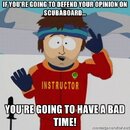The PADI specialties provide useful information, but in my opinion are not worth the money you pay for them. Most of what is learned, you can learn by asking questions on places like Scubaboard, and the rest you can learn by going out diving.
Firstly, I think that responses like these are entirely originated from negative training experiences. They judge the
entire nature of scuba training based upon limited personal experience. There's plenty of really bad, really thread-bare, minimum standard training courses taught... but there's also a lot of really good, really beneficial ones.
Nimoh, with all due respect, if this is your opinion on training... then the lesson
you've not yet learned... is to be more selective and demanding in your choice of training provider.
Secondly,
in the assumption that a high-quality instructor is selected, there are considerable advantages to being trained, rather than self-educating. By the term 'training', I include expert mentoring and other sharing of information beyond formal (paid for) courses. Here's some points that occur:
1) Comprehensive Education: The old cliche "you don't know what you don't know" applies. If self-educating, it is far too easy to omit vital knowledge, skills, drills and procedures simply because you don't know of them, or understand a need for them. A taught course tends to include a comprehensive syllabus that originates from a community/industry consensus and certain level of expertise in the subject.
2) Timescale and Learning Efficiency: Formal training courses provide direct access to the required competencies. Furthermore, it applies a
standard​ of performance...a benchmark.. to the application of those competencies. This is not the case with self-tuition. In providing focus on necessary competencies and a benchmark performance standard, taught courses are far more time-efficient and permit considerably more rapid development than experimentation and development via the uncertain route of 'experience' gathering.
3) Supervision and Safety: In line with the most basic recommendations on 'safe diving practices'; a formal taught course ensures that the developing diver receives adequate supervision whilst conducting dives 'beyond the limits of their prior training and experience'. If taught correctly, a number of diving courses expose divers to conditions, equipment and procedures that could prove to be hazardous if performed incorrectly. Having expert supervision enables that practice and development of experience with the safeguard of specialist supervision.
4) Application versus Understanding: You can understand an issue by reading about it. You cannot gain a skill by the same means. "Knowing" something is not the same as "doing something". Furthermore, the application of benchmark performance standards ensures that you are "doing something
right".
If your goal is to be a better and safer diver, I would suggest taking GUE Fundamentals (Rec). I just actually returned from doing GUE Fundamentals at Zero Gravity in Mexico, and learned a lot. The class is a little intense, 4-12 hour days, but well worth it.
In one breath, you state that training is worthless... in the next breath you recommend training?

As stated, I believe that your opinion on the benefits of training actually represents a personal experience of poor quality training. You identify a single good course that you have taken - and compare that with previous, low quality, courses that you have experienced.
The GUE
Fundamentals is nothing more than the application of
basic scuba competencies. What makes that course 'different' is the application of benchmark standards and instructor specialist expertise. There is no reason why such benchmarks and expertise would not be available in
any scuba course.
GUE offers globalized high benchmarks and expert instruction. With other agencies, lower benchmark performance standards or base-line instructor specialist expertise are the norm. That does not mean they don't exist - merely that they aren't standard. The potential student simply needs to be more discerning about their selection of training provider.
For example, if a GUE instructor taught a PADI PPB course... would that mean the course was 'worthless'? What magical transformation occurs?
---------- Post Merged at 02:08 PM ---------- Previous Post was at 01:55 PM ----------
sounds like you did a peak performance buoyancy specialty as well, or the instructor went above and beyond.
Limited thinking.
A good instructor trains the student to be competent for the task/activity conducted. That will often include various remedial/developmental work on core scuba skills.
Likewise, the 'written syllabus' for X, Y or Z dive courses merely represents the
minimum standards. There is little/no prohibition against an instructor exceeding those standards of training provided. The only thing they
cannot do is withhold certification based upon student performance on non-syllabus training aspects.
i.e. I can train a 'Deep Diver' student to hover horizontally +/- 25cm for 10 minutes, to frog kick, to helicopter turn, to use a pony cylinder, to do precision dive planning and gas management, to use a long-hose..etc etc etc... but I cannot 'fail' them if they don't meet those standards.
Again, be aware of 'limited thinking'. A Deep Diver course
isn't 4 dives maximum... it is 4 dives
minimum. It isn't
only X, Y and Z skills from the manual... it is competency for deep diving...and
all that this entails.
If you feel that A, B or C training is "worthless", then you're exhibiting the same mind-set as the trainers who make those courses worthless.




